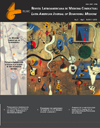Psychoneuroimmunology associated with the quality of life in older adults
Main Article Content
Abstract
The purpose of this research is to describe how they perceive the quality of life and their relationship with the immune system in two groups of older adults in the city of San Luis Potosi, SLP. Included 27 people over 60 years, of which sixteen (59.3%) were residents of a public geriatric and eleven (40.7%) lived with their families.
Both groups was applied the “SF-36 scale” to measure perceived quality of life, which contains eight evaluation criteria, they are: physical functioning, physical role, bodily pain, general health, vitality, social functioning, emotional role and mental health. Also, we took blood samples in order to evaluate the cellular immune system, counting the number of CD3, CD4, CD8, CD19 and CD56.
Differences between groups of people granted asylum and granted asylum are very noticeable in terms of lymphocyte levels and perceptions of quality of life.
Article Details
Citas en Dimensions Service

Este obra cuyo autor es Universidad Nacional Autónoma de México está bajo una licencia de Reconocimiento-NoComercial-SinObraDerivada 4.0 Internacional de Creative Commons.
Creado a partir de la obra en http://www.revistas.unam.mx/index.php/rlmc.
